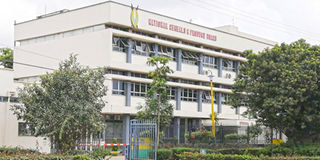Why Kenya’s agriculture players should be excited about the new NCPB Hub system
Sponsored by National Cereals and Produce Board

NCPB head offices in Nairobi.
Kenya has been on an agricultural reforms drive, with the Ministry of Agriculture, Livestock, Fisheries and Co-operatives leading the implementation of the Agriculture Sector Transformation and Growth Strategy (ASTGS) 2019-2029.
The ASTGS seeks to address challenges constraining Kenya’s ability to achieve food and nutrition security. Largely, it involves creating an ecosystem where collaborations, knowledge transfer and spill-over effects can occur more smoothly to spur innovation and create opportunities for business growth.
It is within this framework that the National Cereals and Produce Board (NCPB), a state corporation, has recently introduced a commercial agricultural hub model to enable it go beyond its traditional role of procuring strategic food reserves and supplying fertilizer. The NCPB Hub approach is a vibrant ecosystem for offering variety of services to diverse agriculture value-chain players, while promoting synergies amongst them.
This is coming at a time when the Government is encouraging farmers to shift from subsistence farming to agri-business so as to improve their productivity, and livelihoods too.
The objective of the Government’s Big-Four Agenda goal on “Food and Nutrition Security” is to enhance large-scale food production, increase productivity of smallholder farmers, and reduce the cost of food to increase accessibility. All these are well addressed by the NCPB Hub model that brings together all the important players, including farmers, consumers and dealers in inputs.
The hub model will address concerns regarding quality of agricultural commodities, as only superior products and services will be offered by certified providers, and at fair prices. It is targeted at making NCPB more efficient in service delivery.

Testing for aflatoxin.
The larger objective is to enhance food security and improve small-scale farmers’ economic wellbeing by empowering them with the right information for increasing their productivity.
The NCPB Trading division, which is charged with the responsibility of running the Board’s commercial activity, is tasked with the setting up of the agricultural hubs in different locations and managing them as centres of information and coordination of a network of value chain players to strengthen input and services delivery and enhance market access for agricultural produce.
On February 18, NCPB unveiled the Eldoret Hub as part of six pilot business hubs it seeks to establish. The others that have been set up are in Timbila (Taita Taveta) and Nakuru, while Bungoma, Meru and Nairobi hubs are in the pipeline.
What NCPB hubs offers to different agribusiness players
The NCPB Hub is a centre of effective business activities, operating as a one-stop shop where various products and services are offered.
The concept aims at addressing the challenges faced by small-scale farmers in accessing advice on farming, affordable inputs, markets and other services required for profitable agribusiness ventures.
The hub further creates an ecosystem where collaborations and knowledge transfer can occur to spur innovation and business opportunities, thus benefitting the greater network.
The ASTGS 2019-2029 envisages that the hub trade should enable co-existence among the private sector players, county governments and other stakeholders in the agricultural sector. In this regard, NCPB has strategically positioned itself to partner with private sector players, through its commercial arm – NCPB Trading division.
By providing office space and facilities at a low rent, combined with networking opportunities and advice, the business hubs run by NCPB Trading will offer support to new ventures.
The NCPB hubs are designed to hold various agricultural products, including but not limited to food items, farm inputs, farm implements and agrochemicals. They will also provide advisory services, linkages to intermediaries, leasing out of farm machinery, storage services, fumigation, drying, weighing, cleaning, grading and soil testing. All these to be offered under one roof.
The NCPB Hub business model facilitates the production and collection of quality produce from disadvantaged areas by improving compliance with quality standards. It also provides easy access to markets for farmers, together with opportunities to bargain for better prices.
In addition, the hub enables access to a variety of more affordable farm inputs, implements and mechanisation services. Small-scale farmers are expected to realise increased incomes and better yields.
Produce buyers, on the other hand, will benefit from product aggregation and reliable supply.
On their part, suppliers will provide a wider range of goods and services within a one-stop shop setting; a platform to offer good quality products and services to customers, get space to display machinery and equipment, and access a wider network of clients and opportunities.
Customers will receive quality products due to the availability of grading services in the hub system. They will also benefit from product aggregation and reliable supply.
In a nutshell, various players in the hub will each play own roles that are of mutual benefit to each other.
To achieve success of the hub trading model, NCPB has acquired partners, who include suppliers of fertilizer, seeds, agrochemicals, storage bags and tarpaulins, among others.
The hub business model will also involve stakeholders with important roles to play, such as, registered farmer groups, millers, co-operative societies, county governments, and financial institutions (banks and insurance companies), among others. To ensure smooth and efficient transactions, NCPB has deployed a robust ICT system.

A grain dryer.


